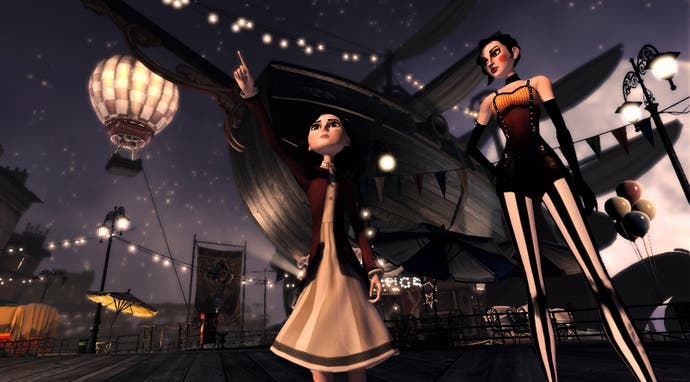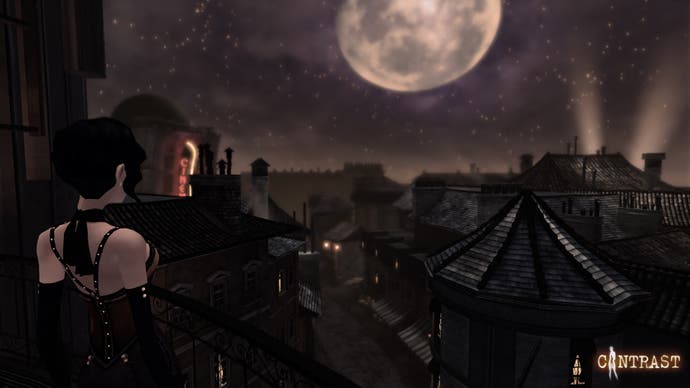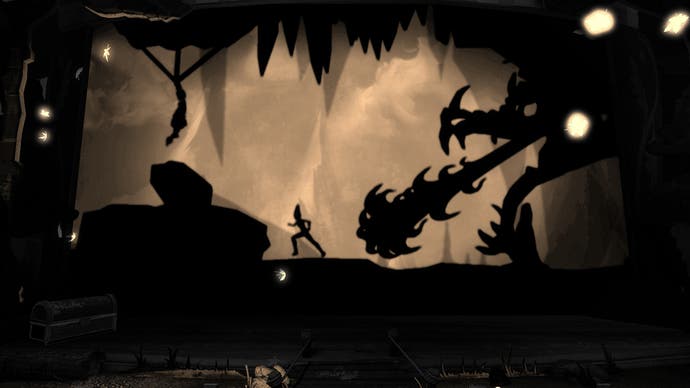Contrast review
Shifty shades of grey.
Contrast is a game about light and dark and the comprehension of physical space, but it's also a game about time. A few months more and this whole experience could have been hammered into fine shape and further refined until it was something special. Instead, laid out in black and white, Contrast is a game of smart ideas and touching moments that fails to live up to its potential due to a frustrating lack of polish and what feels like rushed delivery.
It comes close to being so much more, though. Close enough that it's possible to fall for its easy charm, noir tone, art deco styling and beautiful soundtrack (voiced by jazz singer Laura Ellis), and to grow to love it despite its finicky flaws and clunky execution. I almost did, and if anyone were to tell me that they have I wouldn't blame them one bit.
At its core, Contrast is the story of Didi, a girl growing up in 1920s America, and Dawn, the friend that only she can see. Didi's admiration for her older companion is plain-faced and unabashed but she also views her as a means to help pull together the fragmented shards of her dysfunctional family. Dawn is an acrobatic young woman who exists in a world of light and shade between which she can shift at will, interacting with both physical objects and the shadows that they cast.

The two make for an endearing pair. Didi's earnest chatter fills the silence left by Dawn's mute observation of the world, while the latter's unique means of traversing the environment is a frequent source of wonder to her young companion and, in parts, to the audience, too. Playing throughout the whole adventure as Dawn, everything you do is in the spirit of aiding her young friend, but as the story progresses peculiar details start to come to light by way of the game's two dozen scattered collectibles that hint at wider, more surprising concepts.
Primarily, though, this is a family affair. Didi's estranged father is a well-meaning wannabe whose grand schemes often land him in trouble with unsavoury characters. Meanwhile, Didi's mother dreams of singing her way to a better life for her and her daughter, an ambition that often leads her to leave Didi home alone. This, in turn, draws the ire of the neighbours and results in the precocious youngster regularly sneaking out with Dawn's help to covertly watch her mother sing at clubs around town. The relationships of the three family members are rich and authentically messy, and despite Dawn only being able to witness their interactions playing out as shadows on a wall, their dynamic is surprisingly affecting and full of character thanks to some excellent scene setting, voice acting and script writing.

The family's story provides the driving force for everything that Dawn and Didi do, from eavesdropping on conversations to attempting to fix an ailing circus and visiting the workshop of a famous illusionist. In each environment, you must call upon Dawn's ability to shift between her physical world and that of shadows to traverse otherwise impassable obstacles and solve puzzles to progress the story.
Often, this means manipulating objects in relation to a light source to cast shadows that Dawn can then stand upon once she shifts planes. Other times you'll need to collect little snatches of light known as luminaries to power various contraptions throughout the world. The context of the tasks that Dawn performs is pleasingly varied: snippets of story that play out larger than life against the sides of buildings are beguiling but also double up as a means to reach out-of-the-way ledges, and there's a particularly charming segment that takes place in a shadow-puppet theatre.
On paper, it's all so positive, but there are some frustrating flaws that drag the whole experience down and frequently taint the atmosphere that Compulsion Games has worked so hard to build up. The most obvious complaint is evident straight from the off and concerns a lurching camera and control of Dawn, who feels both skittish and weightless, resulting in some unsatisfactory precision platforming. In some sections it's necessary to shift in and out of the shadow world on the fly or to cross a gap to shift at the point that you make contact with the wall, and it's here that Dawn handling like an alarmed gazelle is most damaging.

Worse, though, is Contrast's raft of technical hiccups that serve as the most explicit indication that with just a bit more time, Compulsion might have grasped what it was reaching for. Perhaps it's the price Compulsion has paid for the privilege of lining up as a day-one PS4 release title, although Contrast is also available on several other platforms, so it's a shame if it has been rushed in order to reach that milestone.
Contrast never feels or looks like it's using the PS4's significant power to its advantage but the one thing this version does benefit from - if you have the option available to you - is the Remote Play function on Vita. Played with earphones on Sony's handheld, Contrast's strengths make it an intimate experience, although Dawn's skittishness is exacerbated here by the Vita's less precise analogue sticks.
As its name suggests, Contrast is a game of light and dark: a puzzle platformer with two well-realised female leads that occasionally buckles under the weight of its own mechanics. It's beautiful in parts, but also a little broken; I admire it for the first and can almost forgive it the second.


